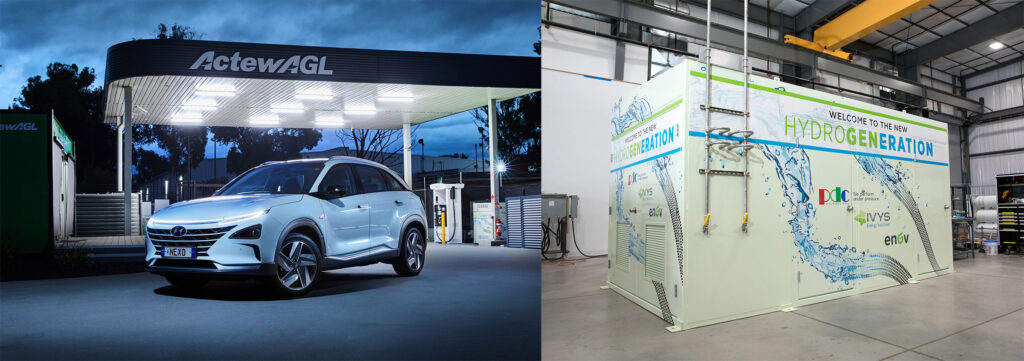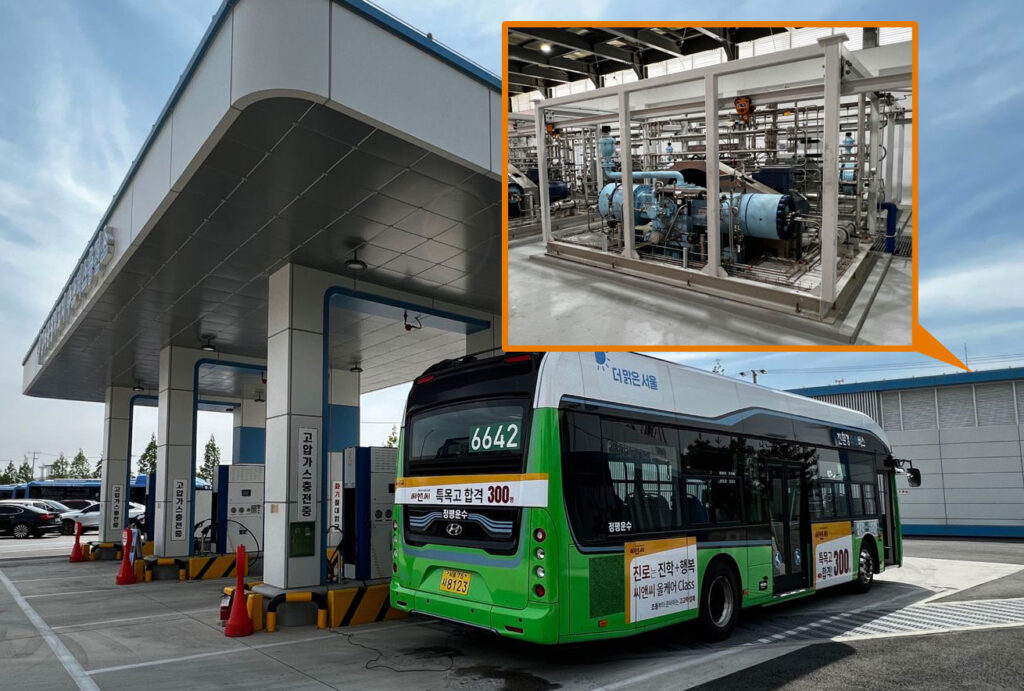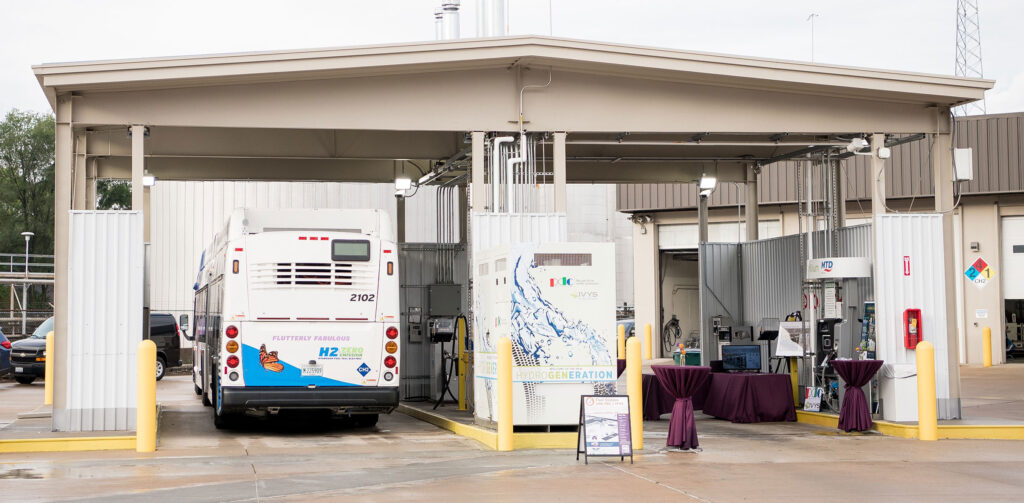Hydrogen Refueling Stations Manufacturing Company
World’s Leading Manufacturer of Hydrogen Gas Compressors for Hydrogen Refueling Stations
PDC specializes in providing complete solutions from compression through dispensing for alternative energy applications. We are the #1 supplier of gas compressors for hydrogen fuel-cell powered automobile, bus and material handling markets with over 1,000 compressor installations worldwide and growing.
With decades of experience in hydrogen compression system integration we are the preferred source for component and systems packaging for hydrogen station fueling applications.

Serving Multiple Industries
Our contamination-free and leak-tight, diaphragm gas compressors can be applied to:
- Hydrogen powered fuel cell vehicles
- Hydrogen powered fuel cell trucks
- Hydrogen powered fuel cell buses
- Hydrogen powered back up fuel cells for stationary or off-grid power generation
- Conversion of biomass to gaseous hydrogen
- Hydrogen powered fuel cell material handling vehicles
- Hydrogen powered back up fuel cells for telecommunication towers
- Conversion of solar and wind power to hydrogen power (power to gas)

Applications
Bus, medium & heavy duty truck fueling, classes 4, 5, 6, & 8
Vehicle fueling
Material handling vehicle fueling
Flow (kg/day)
Beyond 2,500
Beyond 2,500
5 to 2,500
Discharge Pressures
Up to 15,000 psig (1,034 barg)
Up to 15,000 psig (1,034 barg)
Up to 7,000 psig (482 barg)
Reasons to Partner with PDC Machines
Specializes in providing complete solutions for hydrogen energy applications from compression through dispensing
From Compression modules through full-scale commercial stations for vehicles, buses, trucks and material handling vehicles. We offer an extensive line of standard compressors and turn-key design compression systems to meet an array of applications ranging from single-sites to full-scale commercial stations.
SimpleFuel™, On-site Hydrogen Generation, Compression, Storage and Dispensing
SimpleFuel™, refueling appliance ideal for warehouse and small fleet vehicle operations. Click here for more info on SimpleFuel™
PDC Machines is the Preferred Partner for Diaphragm Compressors World-Wide
PDC Machines has developed partnerships with the largest gas producers, researchers and renewable energy technology companies to create and promote the growth of practical and commercial worldwide acceptance of hydrogen as an energy source. Our gas compression equipment is found in demonstration and commercial installations worldwide for hydrogen refueling of automobiles, buses and material handling vehicles.

More About Hydrogen Stations and Hydrogen Fueling Systems
How Do Hydrogen Refueling Stations Work?
Hydrogen refueling stations are truly a revolutionary innovation in the field of renewable energy. They promise to revolutionize how we think about fuel sources and provide an entirely new way for us to power our vehicles with clean energy.
What Is Hydrogen Fuel?
Hydrogen fuel is a form of energy that is produced from the chemical reaction of hydrogen and oxygen. The reaction produces electricity and heat that can be used for various applications. Hydrogen fuel is a clean and renewable source of energy that has been identified as a potential replacement for fossil fuels.
Hydrogen fuel is produced through a process known as electrolysis, which splits water molecules into hydrogen and oxygen. The hydrogen is then compressed and stored as a fuel. The most common method of compressing hydrogen fuel is to use a special tank that is designed to hold the pressurized hydrogen. This process is often used in vehicles that run on hydrogen fuel.
How Is Hydrogen Fuel Used?
Hydrogen fuel cells are also used to generate electrical power. Fuel cells are devices that convert the chemical energy of hydrogen into electrical energy. The hydrogen is fed into the fuel cell, which then combines it with oxygen to produce electricity. This electricity is then used to power various devices such as electric cars or other vehicles. Hydrogen fuel cells are a clean and efficient form of energy that can be used to power homes, businesses, and other applications.
The infrastructure needed for hydrogen refueling stations is complex and expensive, but many countries across the world have begun investing in developing their network of hydrogen production and refueling sites.
Hydrogen refuelling stations require specific safety protocols due to both the flammability of liquid hydrogen and its low boiling point, which results in high pressure when heated up inside a container.
Designs for these hydrogen filling stations vary depending on their purpose; some provide only compressed gaseous H2, while others feature tanks containing cryogenic liquid hydrogen. Many offer both options, so consumers can choose between them depending on their own needs, vehicle type, and budget constraints.
How Much Does Hydrogen Fuel Cost?
Hydrogen refueling stations are like the gas pumps of tomorrow. They provide a convenient way to fill up your car with fuel. Hydrogen fueling is becoming more popular as hydrogen storage and supply capabilities improve. There are now filling stations for hydrogen vehicles popping up all over the country, offering an alternative form of energy that can be used to power cars or other types of equipment.
Hydrogen fuel cost is an important factor to consider when looking into using hydrogen as an alternative fuel source. The cost of hydrogen fuel can vary based on several factors, including the type of fuel, where it is produced, and the method of delivery. When considering the cost of hydrogen fuel, it is important to understand the different types of fuel available, the cost of producing it, and the cost of delivery.
The most common type of hydrogen fuel is compressed hydrogen gas (CHG). CHG is typically produced through electrolysis, which involves the separation of water molecules into hydrogen and oxygen. It is delivered in containers and can be stored at various pressures and temperatures. The cost of CHG is typically determined by the cost of electricity used in the electrolysis, the container size, and the pressure at which it is stored.
Where Can I Find Hydrogen Refueling Stations?
The availability of hydrogen fueling stations is becoming increasingly important as Fuel Cell Electric Vehicles (FCEVs) become more popular. A fuel cell vehicle is powered by a fuel cell that combines hydrogen and oxygen to produce electricity, emitting only water vapor in the process. As such, they have zero emissions and are an environmentally friendly form of transportation to reduce climate change.
Currently, there are publicly available maps showing hydrogen fueling station locations around the world such as Brazil, Germany, Japan, France, Korea, United Kingdom, Norway, Italy, Ireland, Canada, Netherlands, Spain and China to fill-up hydrogen cars. You can find online stations locator via various sources ranging from government websites to private retail station locators. Maps typically show not only the location of each station but also provide additional information about them, such as hours of operation and types of payment accepted.
For those interested in locating new or future upcoming hydrogen fueling station sites, many states now offer a station map specifically for this purpose. Some even feature interactive maps with layers showing planned hydrogen fuel infrastructure sites and their targeted completion dates. These make it easy for users to track progress on upcoming projects in their area.
Additionally, some public utilities may provide access to data sets related to proposed infrastructure development, including planned hydrogen stations, allowing users to check for updates on local projects often before they appear on official maps.
What Are The Benefits Of Hydrogen Fueling Systems?
Hydrogen fueling systems are an innovative and efficient energy solution. They offer several benefits, including reduced emissions, improved fuel efficiency, and cost savings. With the increasing demand for renewable energy sources, hydrogen fueling systems are becoming an increasingly attractive alternative to traditional methods of powering vehicles.
How Does Hydrogen Fueling Systems Work?
Hydrogen fueling systems utilize a process known as electrolysis. This process involves passing an electrical current through water to split it into oxygen and hydrogen molecules. These molecules are then stored in tanks or other storage vessels and used as fuel for vehicles or other machinery.
Using this power generation method, emissions from vehicles powered by hydrogen can be significantly lower than traditional combustion engines. Furthermore, due to their high efficiency, the fuel costs associated with these systems can be much lower than those associated with traditional gasoline-powered vehicles.
What Are The Challenges Of Hydrogen Fueling Systems?
Hydrogen fueling systems present several challenges for their implementation. Hydrogen fuel production is energy-intensive, making it difficult to scale up production in an affordable manner. Hydrogen storage poses a unique challenge due to the need for currently unavailable high- pressure solutions.
Additionally, access to hydrogen refueling solutions is limited due to the need for more availability of hydrogen fueling stations. Furthermore, the cost of energy storage for hydrogen fuel cell electric vehicles is significantly higher than that for traditional internal combustion engine vehicles.
The development and deployment of reliable and safe hydrogen refueling solutions require extensive research and development in the fields of hydrogen production, storage, transportation, and safety standards. As such, there is a need for continued investment in this area in order to ensure the success of hydrogen fueling systems over time.
What Are The Benefits Of Investing In Hydrogen Fueling Station Companies?
Investing in hydrogen fueling station companies is beneficial for many reasons. Companies in the hydrogen fueling station market are experiencing an increase in size and growth due to the need for energy transition, global hydrogen production, and demand for hydrogen fuel cell vehicle technologies.
The following are the benefits of investing in hydrogen fueling station companies:
- Increased Station Deployments: Hydrogen fueling station companies can invest in increased deployments of fueling stations to meet the growing demand worldwide.
- Global Expansion: Investing in hydrogen fueling station companies allows them to expand globally into emerging markets open to new technologies such as fuel cell vehicles.
- Infrastructure Development: Hydrogen fueling station companies can also use investments to develop infrastructure for producing, storing, and distributing hydrogen gas.
- Products & Chemicals: Investing in a company that produces products and chemicals used in fuel cell technology allows for growth due to greater efficiency and cost savings.
These benefits allow investors to capitalize on the growing market share that hydrogen fueling stations have around the world. With increased investments in research and development of new technologies, this will only continue to grow as more countries adopt green energy initiatives.
What Impact Do Hydrogen Fueling Station Companies Have On The Automotive Industry?
Hydrogen fueling station companies have had a major impact on the automotive industry in recent years. With the increased focus on sustainable transportation, hydrogen fuel cell electric vehicles (FCEVs) are becoming more popular. This has led to increased demand for hydrogen fueling stations, and these companies are at the forefront of providing such services.
The automotive industry is undergoing a revolution with the introduction of hydrogen fuel cell technology. Hydrogen fueling station companies have played a major role in this revolution, providing the infrastructure to power cars with this clean and renewable energy source with a simple refuel from a nozzle.
Hydrogen fuel cells are an attractive alternative to traditional gasoline-powered vehicles because they produce zero emissions. This makes them a much cleaner and greener option than traditional cars and one that is gaining traction in the automotive industry.
Hydrogen-powered vehicles are becoming more commonplace and even used in public transportation fleets. This has created a demand for hydrogen fueling stations, which companies are working to fill.
Hydrogen fueling station companies are helping to expand the reach of hydrogen-powered vehicles. Building up the network of hydrogen fueling stations is essential for getting more people to adopt this technology.
By making it easier for people to access hydrogen fuel, these companies are helping to increase the number of hydrogen-powered cars on the roads, which in turn is helping to reduce emissions and improve air quality.
Frequently Asked Questions
How Much Does It Cost To Refill A Hydrogen Car?
The cost of refueling a hydrogen car varies depending on the station’s capacity, construction, and operation. It costs roughly $13 to $18 per kilogram for retail drivers to refill their cars at most public hydrogen fueling stations in the United States.
How Long Does It Take To Refuel A Hydrogen Car?
Refueling a hydrogen car is akin to lighting a match on the fuel gauge – it happens almost instantly. At a hydrogen refueling station, drivers pull up and connect their vehicles to the pump like at any other fueling station. The process of filling up is then typically completed within three minutes or less, providing an incredibly convenient and efficient experience for customers.
Are Hydrogen Fuel Cells More Environmentally Friendly Than Gasoline?
Hydrogen fuel cells are a more environmentally friendly form of transportation than gasoline due to their ability to produce only water vapor as a byproduct. The production process for hydrogen is also considered cleaner and less energy-intensive than petroleum-based fuels. Hydrogen fuel cell cars can store three times as much energy per unit volume as traditional batteries, making them suitable for long distances with fewer refueling stops. Furthermore, hydrogen refueling stations can rapidly fill vehicles in about 5 minutes or less, depending on the delivery pressure, making it considerably faster than other fueling options, such as electric charging.
Are Hydrogen Vehicles Safer Than Gasoline Vehicles?
Hydrogen vehicles may be safer than gasoline vehicles. In terms of fire risk, hydrogen-powered cars have proven to be much less dangerous because they do not require a large tank of combustible fuel like gasoline. Hydrogen is stored in cryogenic tanks and only ignites when it comes into contact with an ignition source such as a spark or flame. Additionally, hydrogen evaporates quickly, unlike gasoline, if released from its tank, so there is little chance of creating a hazardous environment outside the vehicle.
What Types Of Vehicles Can Use Hydrogen Fuel?
Hydrogen fuel is used in several types of vehicles, including light-duty transportation, such as cars and buses, to medium-duty trucks, locomotives, and marine vessels. Hydrogen vehicles are powered by an electric motor fueled by hydrogen stored in specially designed tanks. The onboard system uses hydrogen gas for combustion within a fuel cell stack, generating electricity to power the vehicle’s electric motor.

